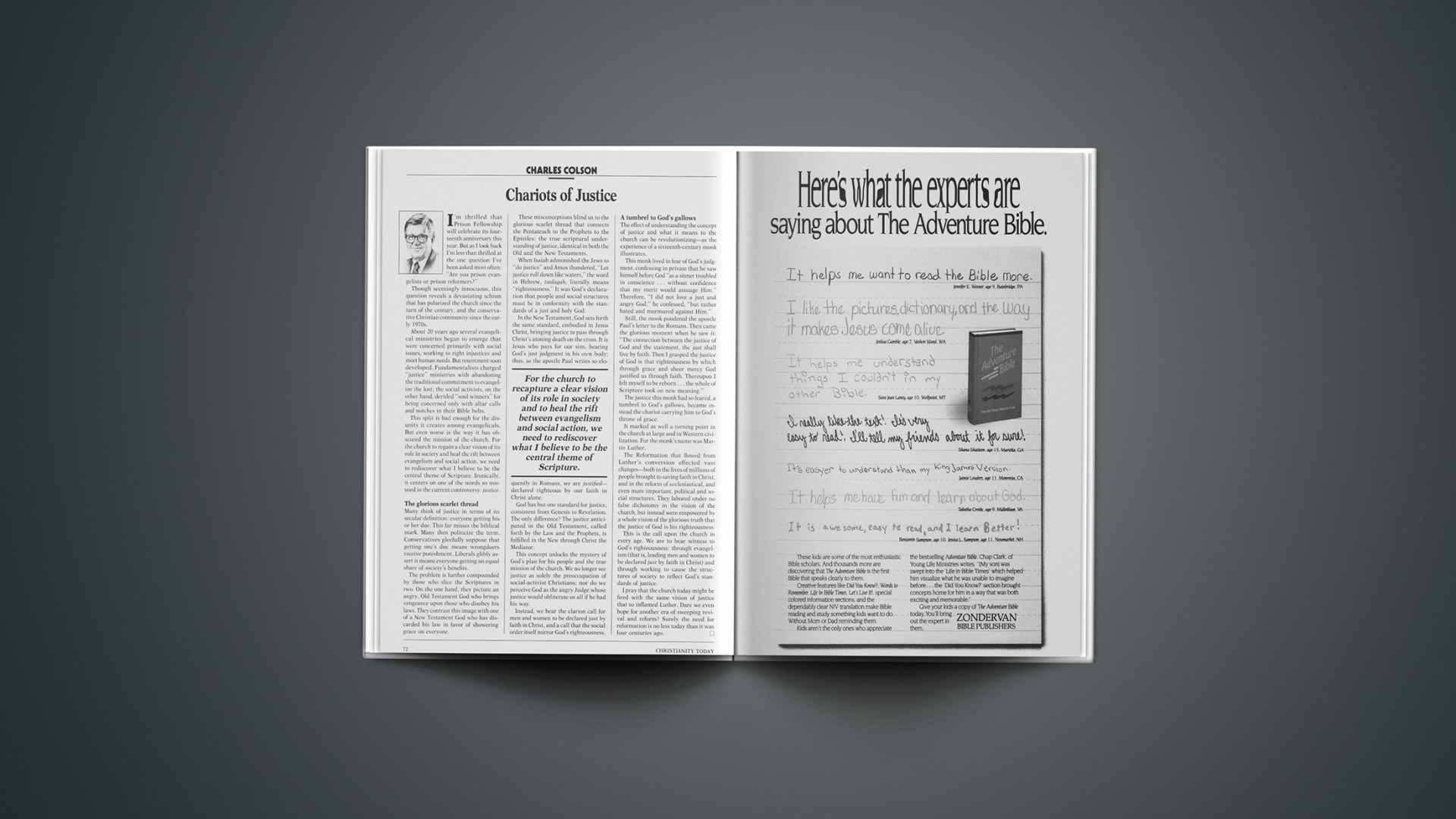I’m thrilled that Prison Fellowship will celebrate its fourteenth anniversary this year. But as I look back I’m less than thrilled at the one question I’ve been asked most often: “Are you prison evangelists or prison reformers?”
Though seemingly innocuous, this question reveals a devastating schism that has polarized the church since the turn of the century, and the conservative Christian community since the early 1970s.
About 20 years ago several evangelical ministries began to emerge that were concerned primarily with social issues, working to right injustices and meet human needs. But resentment soon developed. Fundamentalists charged “justice” ministries with abandoning the traditional commitment to evangelize the lost; the social activists, on the other hand, derided “soul winners” for being concerned only with altar calls and notches in their Bible belts.
This split is bad enough for the disunity it creates among evangelicals. But even worse is the way it has obscured the mission of the church. For the church to regain a clear vision of its role in society and heal the rift between evangelism and social action, we need to rediscover what I believe to be the central theme of Scripture. Ironically, it centers on one of the words so misused in the current controversy: justice.
The Glorious Scarlet Thread
Many think of justice in terms of its secular definition: everyone getting his or her due. This far misses the biblical mark. Many then politicize the term. Conservatives gleefully suppose that getting one’s due means wrongdoers receive punishment. Liberals glibly assert it means everyone getting an equal share of society’s benefits.
The problem is further compounded by those who slice the Scriptures in two. On the one hand, they picture an angry, Old Testament God who brings vengeance upon those who disobey his laws. They contrast this image with one of a New Testament God who has discarded his law in favor of showering grace on everyone.
These misconceptions blind us to the glorious scarlet thread that connects the Pentateuch to the Prophets to the Epistles: the true scriptural understanding of justice, identical in both the Old and the New Testaments.
When Isaiah admonished the Jews to “do justice” and Amos thundered, “Let justice roll down like waters,” the word in Hebrew, tsedaqah, literally means “righteousness.” It was God’s declaration that people and social structures must be in conformity with the standards of a just and holy God.
In the New Testament, God sets forth the same standard, embodied in Jesus Christ, bringing justice to pass through Christ’s atoning death on the cross. It is Jesus who pays for our sins, bearing God’s just judgment in his own body; thus, as the apostle Paul writes so eloquently in Romans, we are justified—declared righteous by our faith in Christ alone.
God has but one standard for justice, consistent from Genesis to Revelation. The only difference? The justice anticipated in the Old Testament, called forth by the Law and the Prophets, is fulfilled in the New through Christ the Mediator.
This concept unlocks the mystery of God’s plan for his people and the true mission of the church. We no longer see justice as solely the preoccupation of social-activist Christians; nor do we perceive God as the angry Judge whose justice would obliterate us all if he had his way.
Instead, we hear the clarion call for men and women to be declared just by faith in Christ, and a call that the social order itself mirror God’s righteousness.
A Tumbrel To God’S Gallows
The effect of understanding the concept of justice and what it means to the church can be revolutionizing—as the experience of a sixteenth-century monk illustrates.
This monk lived in fear of God’s judgment, confessing in private that he saw himself before God “as a sinner troubled in conscience … without confidence that my merit would assuage Him.” Therefore, “I did not love a just and angry God,” he confessed, “but rather hated and murmured against Him.”
Still, the monk pondered the apostle Paul’s letter to the Romans. Then came the glorious moment when he saw it: “The connection between the justice of God and the statement, the just shall live by faith. Then I grasped the justice of God is that righteousness by which through grace and sheer mercy God justified us through faith. Thereupon I felt myself to be reborn … the whole of Scripture took on new meaning.”
The justice this monk had so feared, a tumbrel to God’s gallows, became instead the chariot carrying him to God’s throne of grace.
It marked as well a turning point in the church at large and in Western civilization. For the monk’s name was Martin Luther.
The Reformation that flowed from Luther’s conversion effected vast changes—both in the lives of millions of people brought to saving faith in Christ, and in the reform of ecclesiastical, and even more important, political and social structures. They labored under no false dichotomy in the vision of the church, but instead were empowered by a whole vision of the glorious truth that the justice of God is his righteousness.
This is the call upon the church in every age. We are to bear witness to God’s righteousness: through evangelism (that is, leading men and women to be declared just by faith in Christ) and through working to cause the structures of society to reflect God’s standards of justice.
I pray that the church today might be fired with the same vision of justice that so inflamed Luther. Dare we even hope for another era of sweeping revival and reform? Surely the need for reformation is no less today than it was four centuries ago.










